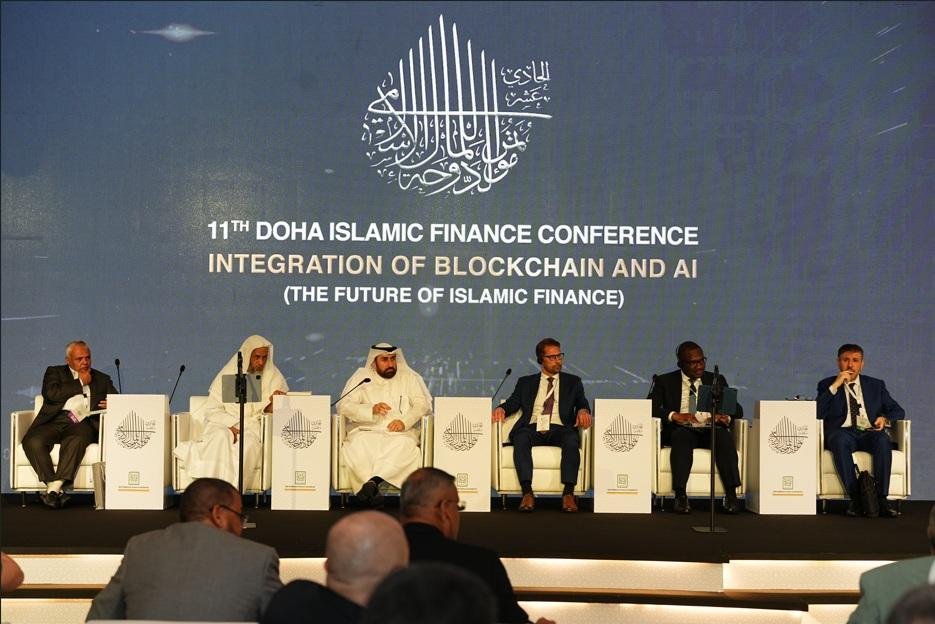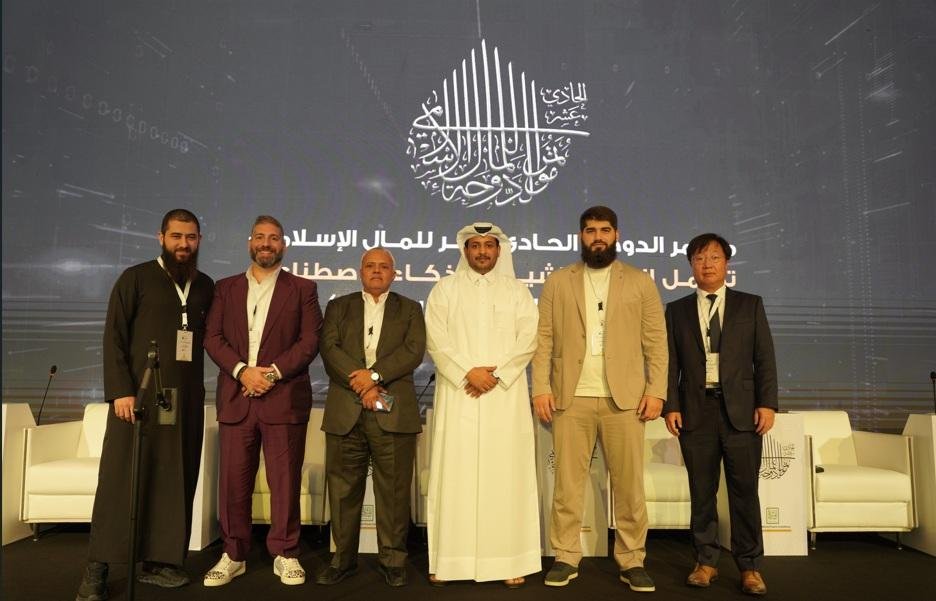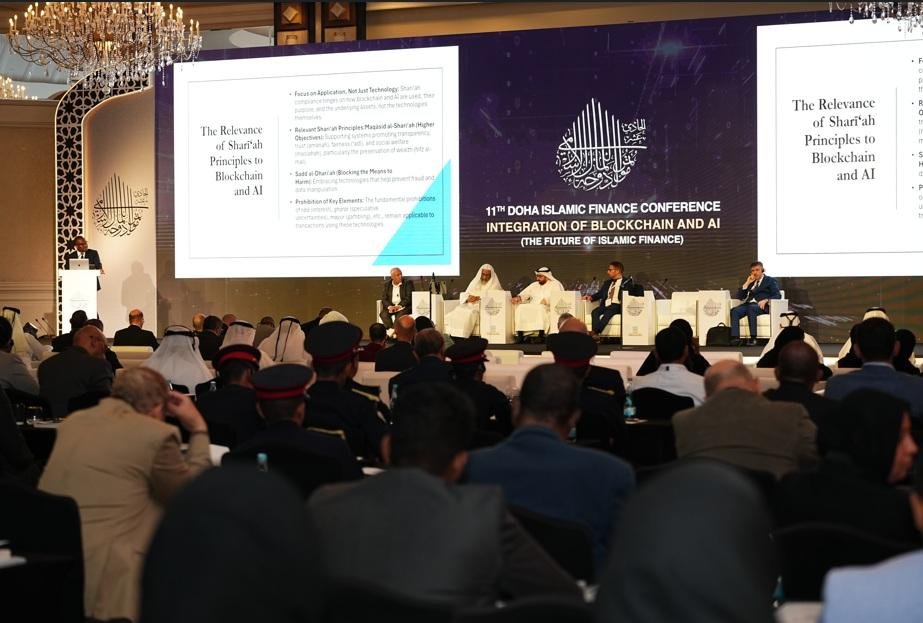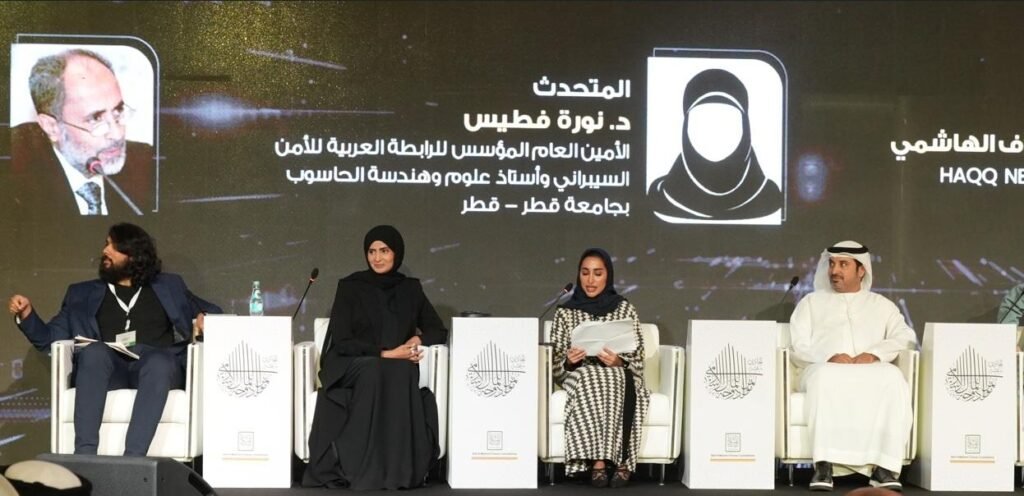Doha, 10 Apr. 2025
The 11th Doha Islamic Finance Conference concluded its sessions and issued its final statement, recommending the development of a Sharia-compliant regulatory framework for blockchain and artificial intelligence applications. The conference called on Islamic financial institutions, regulatory bodies, and technology experts to collaborate in setting standards for smart contracts, AI governance, and experimental regulatory environments tailored to blockchain and AI. The aim is to create balanced frameworks that encourage innovation while adhering to Islamic principles.
Mashura Financial Consulting, in collaboration with the Ministry of Commerce and Industry; Dukhan Bank (strategic partner); General Department of Endowments, Ministry of Endowments and Islamic Affairs (Diamond Sponsor); and Qatar Financial Centre (QFC) as Bronze Sponsor. The event was held under the patronage of Sheikh Mohammed bin Abdulrahman Al Thani, Prime Minister and Minister of Foreign Affairs.
The conference attracted wide international participation from government entities, international organizations, financial institutions, and academic bodies involved in economics, finance, and technology. Since its launch in 2010, the Doha Islamic Finance Conference has become more than just an annual gathering—it is a prestigious and influential platform that continues to shape the global trajectory of Islamic finance. Organized by Bait Al-Mashura since its inception, it consistently draws top-tier experts, scholars, practitioners, and industry leaders who engage in insightful discussions and share visions on the evolving Islamic finance landscape.
The conference is known as a central hub for knowledge exchange and thought leadership, tackling the most pressing issues facing the industry. Its agenda is curated annually to reflect the latest trends and developments in Islamic finance, ensuring its ongoing relevance and impact.
The final communiqué emphasized the need to accelerate the evaluation and monitoring of decentralized finance (DeFi) in order to assess its associated risks and influencing factors, as well as its proximity to bridging the gap between innovation and the values-and-regulation chain. It underscored that the essence of Islamic finance lies in a system built on values and ethics. Whether centralized, decentralized, or hybrid, the Islamic financial system must strike a balance between innovation, values, and regulation, while striving toward a fairer, more Sharia-compliant, and sustainable financial model.
The statement addressed the issue of electronic games, noting that they cannot be judged uniformly due to their diverse nature. Their permissibility depends on compliance with Sharia-based criteria that ensure legitimate benefits of gaming and entertainment while mitigating potential harms. It further highlighted that financial transactions related to gaming—such as account creation, selling, or in-game purchases—share the same ruling as the game itself and must also adhere to rules governing electronic financial transactions.
The conference also pointed to the importance of future-oriented Islamic jurisprudence in modern legal scholarship. It suggested that AI could be utilized to enhance the prediction and evaluation of future legal scenarios by leveraging its data analysis and reasoning capabilities. The integration of blockchain and AI, it added, has shown practical success in some Islamic financial institutions by improving Sharia compliance through increased transparency, enhanced auditing, and reduced manipulation risk. This integration opens new avenues for Islamic banks to improve performance, enhance operational efficiency, and innovate products—bolstering their competitiveness in the global financial industry.
The communiqué also highlighted the role of AI and blockchain in enhancing the management, transparency, and sustainability of endowments (awqaf). These technologies can improve asset management, ensure efficient distribution, and strengthen governance. However, several challenges were noted, including data privacy, low trust in technology related to humanitarian/social causes, and high financing costs. These issues, it said, could be addressed through digital transformation of awqaf institutions, training of personnel, and strategic efforts to overcome barriers.
A call was made for smart legal governance and algorithmic indexing of endowment documents to lay the foundation for a "Waqf Document Bank", which would bridge the gap between researchers and the historical memory of Islamic civilization, while safeguarding the assets of endowments.
During the scientific sessions, the conference explored four key themes:
- Decentralized AI: Rulings and Guidelines
- Waqf in Light of Blockchain and AI Integration
- Blockchain-based Gaming: Legal Rulings and Investment Opportunities
- Value Chains in AI-Enhanced Decentralized Finance
These topics were presented through research papers from scholars, academics, and industry professionals, enriched by discussions and interventions that added depth to the conference discourse.
The 11th edition of the Doha Islamic Finance Conference was organized by Bait Al-
About Bait Al-Mashura Financial Consulting:
Bait Al-Mashura is a privately held Qatari firm and the first of its kind licensed to offer Sharia-compliant consultancy, development, and training in Islamic banking. It serves Islamic and conventional banks, investment firms, insurance companies, and brokerage firms at all levels. The company's establishment reflects Qatar's evolving financial landscape and the global Islamic finance system, especially across the Gulf, Europe, and Asia. Its creation responded to the growing need for specialized advisory services in Islamic finance, driven by regulatory advancements and the public’s increasing demand for Sharia-compliant products. Bait Al-Mashura aims to fill the expertise gap created by this rapid industry growth, supporting institutions with tailored, future-oriented solutions.













